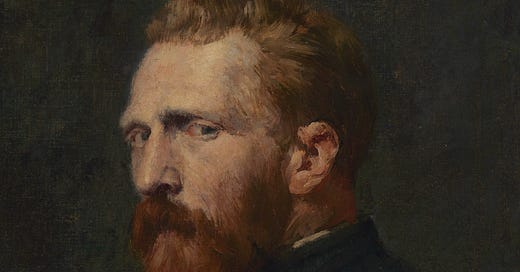"I don’t know myself how I paint"
Vincent van Gogh on the advantages of never learning to paint.
In a letter written to his brother Theo in September 1882, included in Ever Yours: The Essential Letters, Vincent van Gogh reflects on the advantages of not having formal training in painting.
I’ve included a long excerpt from it below.
At the end of the article, I broke down some common themes that you can apply to your daily routines — regardless of your goals.
If you want to support my work, please share it with someone (it helps so much).
While making it I said to myself: let me not leave before there’s something of an autumn evening in it, something mysterious, something with seriousness in it.
However, because this effect doesn’t last, I had to paint quickly. The figures were done with a few vigorous strokes with a firm brush — in one go. I was struck by how firmly the slender trunks stood in the ground — I began them using a brush, but because of the ground, which was already impasted, one brushstroke simply disappeared. Then I squeezed roots and trunks into it from the tube, and modelled them a little with the brush. Yes, now they stand in it — shoot up out of it — stand firmly rooted in it. In a sense I’m glad that I’ve never learned how to paint. Probably then I would have LEARNED to ignore effects like this. Now I say, no, that’s exactly what I want — if it’s not possible then it’s not possible — I want to try it even though I don’t know how it’s supposed to be done. I don’t know myself how I paint. I sit with a white board before the spot that strikes me — I look at what’s before my eyes — I say to myself, this white board must become something — I come back, dissatisfied — I put it aside, and after I’ve rested a little, feeling a kind of fear, I take a look at it — then I’m still dissatisfied — because I have that marvellous nature too much in mind for me to be satisfied — but still, I see in my work an echo of what struck me, I see that nature has told me something, has spoken to me and that I’ve written it down in shorthand. In my shorthand there may be words that are indecipherable — errors or gaps — yet something remains of what the wood or the beach or the figure said — and it isn’t a tame or conventional language which doesn’t stem from nature itself but from a studied manner or a system.
How to Apply This to Your Life
The insights from Van Gogh’s approach to painting offer valuable lessons that can enhance your creative process, regardless of what craft you’re pursuing.
Embrace Your Intuition: Just as Van Gogh found freedom in his untrained approach, allow yourself to trust your instincts. Whether in your creative endeavors or everyday decisions, tapping into your intuition can lead to authentic and meaningful outcomes.
Seize Fleeting Moments: Van Gogh emphasized the importance of capturing the essence of transient experiences. In your life, make it a priority to recognize and act on those fleeting moments that inspire you. Whether it’s a spark of creativity or a valuable opportunity, be ready to act quickly and embrace spontaneity.
Experiment Boldly: Van Gogh's willingness to experiment with unconventional methods reminds us that it’s okay to break the rules. In your own work, don’t be afraid to try new approaches, even if they feel uncomfortable. This willingness to experiment can lead to breakthroughs and innovations.
Accept Imperfection: Van Gogh acknowledged that his work had flaws but found beauty in those imperfections. In your journey, remember that perfection is often unattainable. Embrace your mistakes and learn from them; they can lead to growth and unique experiences that shape your path.
Prioritize Personal Expression: Like Van Gogh, value your own experiences and perspectives over external expectations. Allow your personal voice to shine through in your work and interactions. This authenticity will resonate with others and create a more genuine connection.
Practice Reflection: Van Gogh’s process of reflection shows the importance of assessing your work and feelings. Set aside time to evaluate your progress and consider how you can improve. This reflective practice can lead to personal growth and deeper insights into your creative journey.
Thanks for reading! I post writing-related content like this three times a week. If you want access to the full archive, consider upgrading to a paid subscription. You can also help me grow by sending this to a friend. Thanks, and see you next time!






We can learn a lot about Vincent van Gogh, regardless of what our art form is. He was a genius; it’s heartbreaking that he was also tormented.